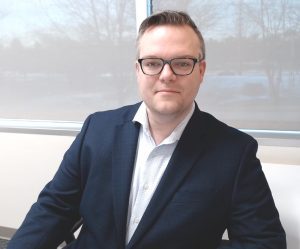
5 Questions With Michelle Gilson, CFO of Arcellx
March 8, 2023
“5 Questions With…” is a recurring BioBuzz series where we reach out to interesting people to share a little about themselves, their work, and maybe something completely unrelated. This week we welcome Michelle Gilson, Chief Financial Officer of Arcellx.
Most recently, Gilson served as a Managing Director and Senior Equity Research Analyst at Canaccord Genuity, covering biotechnology companies. Prior to joining Canaccord, she held biotechnology equity research roles at Jefferies, LLC; Instinet, LLC (Nomura Securities); Oppenheimer & Co. Inc.; and Goldman Sachs. Ms. Gilson earned her B.S. in Business Administration from the University of Southern California.
1) Please introduce yourself to our audience by looking back at your education, training and career.
I joined Arcellx as Chief Financial Officer in May 2022 after Rami Elghandour, Chairman and CEO of Arcellx, approached me and introduced me to the company. Arcellx had the corporate positioning I was looking for in a biotech company: A promising lead program with potential to meaningfully impact patients’ lives, a platform technology that a pipeline could be built upon, operating in a growing space, and great people at its core. As CFO of a public company, I am accountable for our financial reporting process, building out our bicoastal finance team, and managing the budget and capitalization of our company. As a part of this, I contribute to the key decision-making processes here and interface with investors to help them understand what we are working on at Arcellx, which ties back to my prior experience as an equity research analyst.
Prior to joining Arcellx, I spent nearly 10 years on Wall Street covering biotech equities as a research analyst. In that role, I researched and analyzed biotech companies and their stocks, which helped me hone into the key drivers and pitfalls of drug development and recognize what makes a successful company in the biotech space. Now I can bring those skills into this new role, helping to identify the key factors behind investors’ perception of the company and thinking about how our corporate strategy can impact the long-term trajectory of Arcellx and potentially avoid the pitfalls of other companies that have been in similar development stages.
2) You have 10+ years in the industry – what are some lessons you experienced early on that have helped you every step of your career?
One of the best things that happened to me early in my career was that I made mistakes, failing early and often, but always reflecting on where things went wrong and growing from the experience. It taught me that (1) I hated the feeling (and would not make the same mistake twice); (2) how to pick myself up and move forward in a more informed way; and (3) that I could survive failure. This helped me be unafraid to take bold risks and try to accomplish big goals in my career, but to also be knowledgeable and unbiased as much as possible while navigating uncertainty. It also taught me that confidence comes from experience. Knowing that I was capable because I had benefited from learning those hard lessons early on allowed me to make fewer mistakes as my career progressed. I was fortunate to have those experiences early on versus later, when the impact is greater.
Over time, I have also learned to value soft skills more, especially as I have realized how impactful effective teams can be. I value the people that I work with, respect their views even when different from my own, and try to understand and learn from them, as well. As a manager, I aim to bring out the best in people I work with on a day-to-day basis, which can look different for each individual.
Early on in my Wall Street career, I found that some of my managers failed to recognize how to support their direct reports just starting their careers. Instead of seeing that the team would be more successful if the people under them succeeded, they saw their associate pipeline as either a threat or they favored a burnout approach to managing churn. As a manager, my belief is that if managed well, people will outgrow roles, and I am not intimidated by the success of my team members. Instead, I choose to support and celebrate those that report to me, even if it means they move on from being part of my team.
I also believe that the way to maximize output is by hiring the right people, understanding their motivations and goals, and creating an environment that is mutually beneficial that people want to contribute to and stay in until they grow out of it. If you can provide and support the opportunity for the next step, that is even better, but sometimes that’s not possible and we need to adapt.
3) What made you transition from the investment side of biotech to working for a promising startup like Arcellx? What about the company’s environment is appealing to you?
The driving force was that I had accomplished what I had set out to do on the sell-side and was looking for a new challenge that would have a different kind of impact than my prior role. Ultimately Arcellx was the right opportunity for me, at the right time.
I previously outlined some of the qualities I was looking for in a biotech company I would like to join: Promising lead program with potential to meaningfully impact patients’ lives, a platform technology that a pipeline could be built upon, operating in a growing space, and great people at its core. Beyond this, Arcellx truly felt like a special company for me to build my career at.
During my tenure as a stock analyst, I found that special companies are very rare – to have the right science in place at the right time for the space, with the right people to move it forward in the right way – doesn’t happen frequently. However, at Arcellx, I feel we have the right team, the right asset and a bold strategy to potentially deliver a novel therapy that will benefit patients in a meaningful way. I am also very proud and encouraged by our accomplishments achieved in the one year since joining the company. It is a testament to the talent and leadership here!
Values are another important element that set Arcellx apart for me. Not only creating values, but really living them out as a team. For example, Arcellx values diversity, equity and inclusion in an impactful way. Yes, we are proud of the fact that women and people of color represent 70% of the C-suite leadership, 70% of employees in core life sciences and technical roles, and 86% of the Board of Directors – all much higher than the industry average. But more so, we are proud that we have been able to put the best people in these roles in our company and create the best team by not being biased to convention.
Collaboration is also critical to our success as a biotech startup. When the leadership team is able to foster the idea that no job is too small and we can win together, employees are willing to help each other out, even if it’s a task that’s not part of their regular responsibilities. What I’ve seen at Arcellx is that as that shared sense of responsibility grows, the company benefits as a whole both financially as well as with increased security and lower employee turnover. I believe the company’s recent accomplishments are reflective of these purpose-driven elements of Arcellx.
4) What are some driving factors for wanting to be a part of the rapid innovation in the biotech field?
Biotech is a very unique space because the impact is so tangible. You can see the impact reflected in the data – successful clinical trials represent how a therapy can better people’s lives by improving on some aspect of their health. At Arcellx, we are focused on making a transformational impact by advancing cancer treatments through a new technology called cell therapy. If we are successful, our therapy could meaningfully improve the lives of multiple myeloma patients across the globe. This is both a massive responsibility and opportunity for the company.
Arcellx’s lead program CART-ddBCMA is a CAR-T therapy for patients with multiple myeloma that has demonstrated very promising clinical data and recently entered a Phase 2 pivotal clinical trial. But we aren’t planning to stop at multiple myeloma – we have also started a clinical study in relapsed/refractory acute myeloid leukemia and high-risk myelodysplastic syndrome which uses our novel ARC-SparX technology, which we hope will allow for a dosable and controllable CAR-T therapy that can unlock new indications and targets to expand the field. Everything is moving forward quickly, which is exciting.
5) If you had the opportunity to go on any television game show, which one would you go on and why? Ex: Family Feud, Jeopardy, etc?
Right now, it would have to be “Are You Smarter Than a Fifth Grader?”, since my son is at an age where he thinks fifth graders are really smart. He would see it as a big accomplishment to be smarter than a fifth grader!
- About the Author
- Latest Posts
BioBuzz is a community led, experience focused, biotech and life sciences media and events company. BioBuzz highlights regional breaking news, industry professionals, jobs, events, and resources for business and career growth. Their weekly newsletter is subscribed to by thousands in the BioHealth Capital Region and Greater Philadelphia as the go-to for industry updates.








